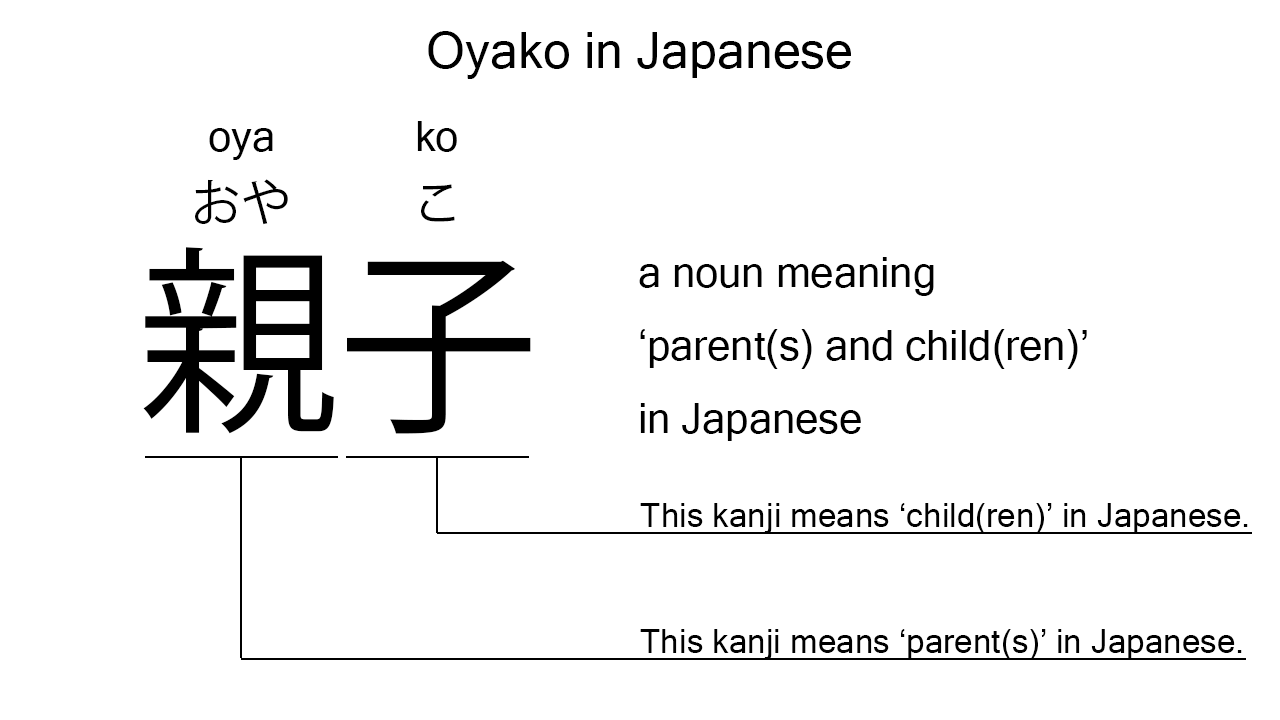What does “oyako” mean in Japanese?
Native speakers say “oyako” to mean ‘parent and child’ in Japanese. Perhaps, some Japanese learners know this word as it is sometimes used in Japanese conversations. In this blog post, however, I will explain it in detail based on its kanji expression. And also, I will explain how to use it through example sentences. My explanations would help Japanese learners understand “oyako” more clearly. Then, let’s get started!
Contents
Definition and meaning of “oyako”
Let me start with the definition and meaning of “oyako”.
- oyako – 親子 (おやこ) : a noun meaning ‘parent and child’ in Japanese. This can also work as plural. Learn more about Japanese plural.
The definition and meaning are simple and clear. To understand this noun more clearly, however, let me explain its kanji characters in detail, one by one.
What does “oyako” literally mean in Japanese?
The kanji expression of “oyako” consists of the following two kanji characters:
- 親 : a kanji character often used to mean ‘parent’ in Japanese.
- 子 : a kanji character often used to mean ‘child’ in Japanese.
From these two kanji characters, we can understand that the formed noun literally means a ‘parent and child’ in Japanese. This literal interpretation is completely in line with the actual meaning.

When we meet new kanji expressions, we should check their kanji characters in detail to understand their meanings clearly and deeply. In many cases, kanji characters tell us a lot about the meanings of the expressions they form. Actually, here, we could get the better understanding of “oyako” through the detailed kanji check above.
So far, I’ve explained the definition and meaning of “oyako” together with its kanji characters. Then, let me explain how to use it through the example sentences below.
Example #1: how to say “parent and child” in Japanese
kanojo tachi wa oyako desu yo – 彼女達は親子ですよ (かのじょたちはおやこですよ)
They are a parent and child.
Below are the new words used in the example sentence.
- kanojo – 彼女 (かのじょ) : a pronoun meaning ‘she’ in Japanese.
- tachi – 達 (たち) : a suffix used after a noun or pronoun to make its plural form. In the example, this is used after “kanojo” to make its plural form, “kanojo tachi”, which means ‘they’ in Japanese.
- wa – は : a binding particle working as a case marker or topic marker. In the example, this works after “kanojo tachi” to make the subject in the sentence.
- desu – です : an auxiliary verb used after a noun or adjective to make it polite. Probably, this is well known as a part of Japanese desu form. In the example, this is used after “oyako” to make it sound polite.
- yo – よ : a sentence-ending particle used to state the fact or idea in a soft way. As the definition suggests, this is used at the end of the example sentence to state the fact in a soft way. This has not been reflected in the English sentence, though.
This is a typical usage of “oyako”. In this example, it works as the complement in the sentence. When we want to mean a ‘parent and child’ in Japanese, this noun is always a very good option.
Example #2: another usage of “oyako”
oyako no kizuna wa totemo tsuyoi – 親子の絆はとても強い (おやこのきずなはとてもつよい)
Parents’ and children’s ties are very strong.
Below are the new words used in the example sentence.
- no – の : a case particle used after a noun or pronoun to make its possessive case. In the example, this is used after “oyako” to make its possessive case, “oyako no”, which means “parents’ and children’s” in Japanese.
- kizuna – 絆 (きずな) : a noun meaning ‘tie’, ‘bond’, or ‘strong relationship’ in Japanese. This can also work as plural.
- totemo – とても : an adverb of degree meaning ‘very’, ‘much’, ‘so’, or such in Japanese. In the example, this works in front of “tsuyoi” to emphasize its meaning.
- tsuyoi – 強い (つよい) : an i-adjective meaning ‘strong’ in Japanese.
This is another typical usage of “oyako”. In this example, it works together with “no” and “kizuna” to mean “parents’ and children’s ties” in Japanese. The border between singulars and plurals in Japanese is very ambiguous and thus many nouns can work in both ways. So, when we want to mean ‘parents and children’ in Japanese, this noun can be a very good option.
Summary
In this blog post, I’ve explained the definition and meaning of “oyako” in detail based on its kanji expression. And also, I’ve explained how to use it through the example sentences. Let me summarize them as follows.
- oyako – 親子 (おやこ) : a noun meaning ‘parent and child’ in Japanese. This can also work as plural. These two kanji characters literally mean a ‘parent and child’ in Japanese. This literal interpretation is completely in line with the actual meaning.
Hope my explanations are understandable and helpful for Japanese learners.
Leave a Reply